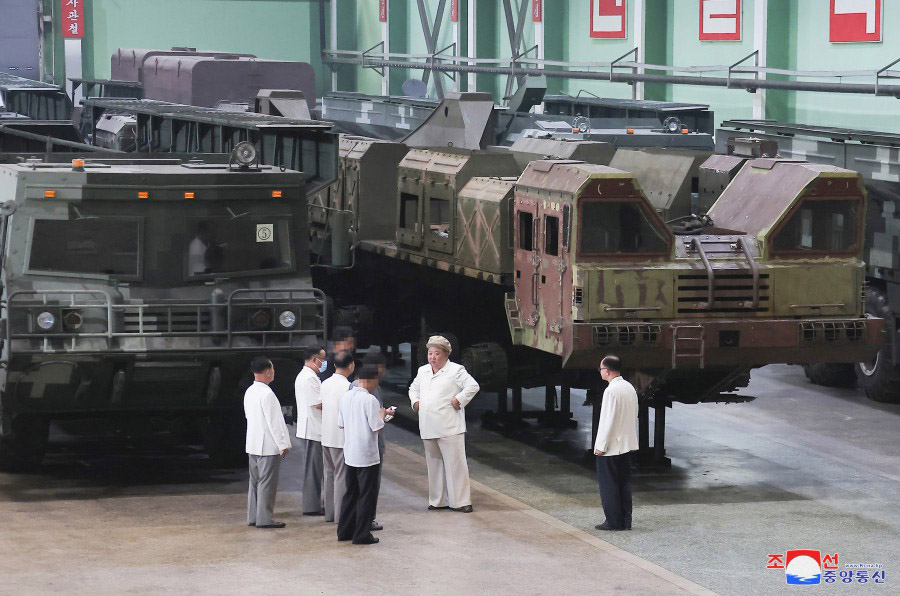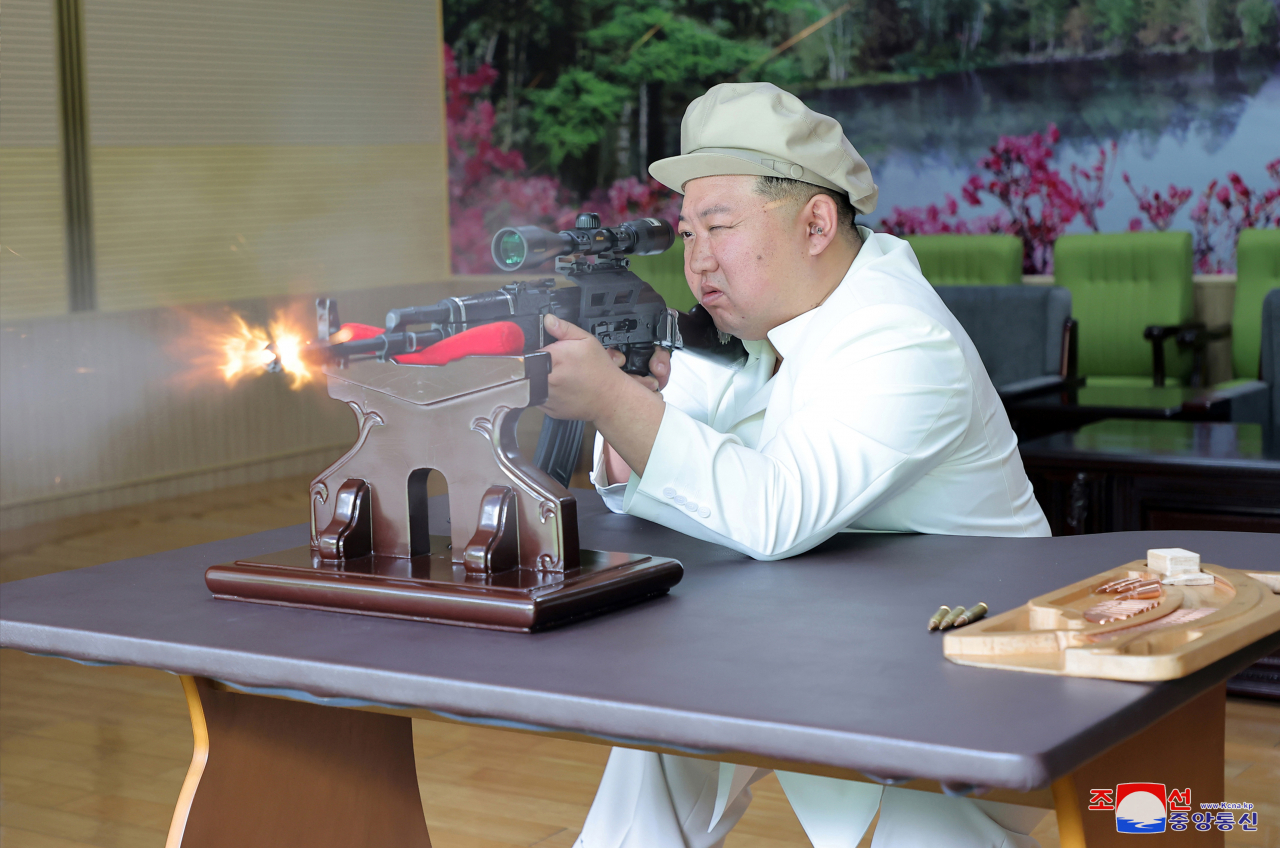 |
North Korean leader Kim Jong-un is seen giving field guidance at a missile transport erector, or TEL, production facility in this photo carried by North Korea's state-run Korean Central News Agency on Sunday. (Yonhap) |
North Korean leader Kim Jong-un has conducted a series of rare visits to his country's arms factories, underscoring their role in war preparations, notably in the run-up to major defense-oriented military exercises between South Korea and the United States.
But experts in Seoul also noted that these visits may serve a dual purpose, not only emphasizing North Korea's determination to continue its military buildup but also promoting its weapons for potential export to Russia.
Kim made the three-day factory tour through Saturday, where he assessed the progress in implementing the key objectives of the ruling party's policies for the munitions industry, North Korea's state-run media outlet, the Korea Central News Agency, reported Sunday.
Kim also personally provided instructions to enhance the production capacity of weapons factories and streamline production processes.
During his tours, Kim specifically guided the factories responsible for producing ammunition for large-caliber multiple rocket launchers and a new family of sniper weapons.
During his visit to a factory producing multiple rocket launcher ammunition, Kim stressed its "crucial responsibility and mission in further completing the war preparations of the Korean People's Army," according to the Korean-language dispatch.
Furthermore, Kim emphasized the significance of "modernizing sniper weapons for front-line units of the Korean People's Army and other units engaged in armed struggle in enemy rear areas." He considered it an "urgent and paramount task in war preparations, taking into account the evolving nature of warfare."
North Korean state media released photos showing Kim firing a new model assault rifle and a sniper rifle during his factory visits.
Kim also visited factories that manufacture engines for strategic cruise missiles, armed unmanned aerial vehicles, and "strategic missile erector launchers."
Kim conducted on-site guidance at a "new light electrical appliance factory" under construction, which, according to state media, will "play a crucial role in modernizing the KPA."
 |
North Korean leader Kim Jong-un is seen firing an assault rifle, which resembles the US Special Operations Forces Combat Assault Rifle or FN SCAR in appearance. North Korea's state-run Korean Central News Agency released a photo on Sunday. (Yonhap) |
Seoul-based experts share the view that Kim's tours of munitions factories are intended to serve multiple purposes.
These recent visits occurred at a crucial juncture as South Korea and the US have been preparing to conduct the 11-day computer-simulated Ulchi Freedom Guardian exercises starting on Aug. 21, along with associated large-scale field training exercises.
"The visits to the factories aim to demonstrate the country's reinforced will and principle of strength-for-strength and head-on confrontation against the US and South Korea," said Lim Eul-chul, an associate professor specialized in North Korea's economy and politics at Kyungnam University.
"The tours are intended to reaffirm the determination to respond to the deployment of US strategic assets on the Korean Peninsula by displaying overwhelming deterrence, as previously mentioned in press statements issued by Defense Minister Kang Sun-nam and Kim Yo-jong."
But Lim also pointed out the other key audience for Kim's tours is Russia, which has been accused of importing weapons, including millions of artillery shells and rockets, from North Korea, amid its grinding war with Ukraine.
Echoing the view, Yang Moo-jin, a professor at the University of North Korean Studies in Seoul, Kim did not make any overtly hostile or bellicose rhetoric toward South Korea and the US during the on-site inspections, while emphasizing the importance of munitions factories in enhancing war preparedness.
The absence of direct messages targeting Seoul and Washington during Kim's tours indicates that the primary intention was likely to draw attention from Russia and demonstrate North Korea's military capabilities, possibly with the aim of promoting arms exports or exploring defense-related cooperation with Russia.
The timing of Kim's tours to weapons factories is noteworthy.
In late July, Kim personally showcased North Korea-produced weapons, such as the Hwasong-17 and Hwasong-18 intercontinental ballistic missiles, as well as newly developed unmanned aerial vehicles resembling the US Global Hawk and the US Reaper, to Russian Defense Minister Sergei Shoigu at a defense exhibition.
The Russian military delegation, led by Shoigu, visited Pyongyang to commemorate the 70th anniversary of the July 27 armistice, which brought about the cessation of the 1950-1953 Korean War and which North Korea refers to as Victory Day. Kim and Shoigu also held two separate meetings where they discussed cooperation in the fields of defense and security.
Experts also underscored the significance of North Korean state media's first use of the term, "national defense economic projects."
"The use of the term, 'national defense economic projects,' this time indicates that the defense industry is not only meeting domestic demand but also contributing to North Korea's acquisition of foreign currency and economic revitalization through weapons exports," said Cheong Seong-chang, the director of the Department of Reunification Strategic Studies at the Sejong Institute.
Jung Dae-jin, a professor of global business at Halla University in Wonju, Gangwon Province, said the state media's unusual but detailed reports on Kim's visits to weapons factories served to emphasize potential arms exports to Russia.
"The unusual public exposure of the on-site inspections at munitions factories, which are typically not disclosed to the outside world, carries an implicit message of Kim Jong-un personally providing his 'quality assurance certificate' to Russia," Jung said.
Jung said the media reports highlighted "Kim Jong-un's particular interest and inspections of the factories responsible for producing items expected to be exported as military supplies to Russia, such as shells and ammunition."







![[Today’s K-pop] Blackpink’s Jennie, Lisa invited to Coachella as solo acts](http://res.heraldm.com/phpwas/restmb_idxmake.php?idx=644&simg=/content/image/2024/11/21/20241121050099_0.jpg)